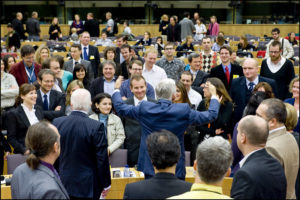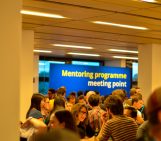
On July 17 2019, the EU Commission’s Joint Research Centre (JRC) published a report highlighting how thinking is challenged by today’s information environment and the role of evidence-informed policymaking in a well-functioning democracy. Titled Understanding our political nature, the report was produced with the assistance of 60 international experts in the humanities, behavioural and social sciences who analysed how and why emotions, values and identity impact how we think, talk and vote.
The report underscores that rebutting myths, fact checking and increasing scientific literacy are necessary but still not sufficient to improve policymaking, enable scientific evidence or maintain a healthy democracy. How citizens take political decisions at an individual, collective and institutional level must also be understood and addressed.
Key findings
Misperception and disinformation
People don’t always think rationally. While this isn’t necessarily a problem, neglecting it and basing politics on that assumption is.
The way in which people receive information has changed rapidly with the introduction of the internet and social media. This transformation has enabled political actors to communicate in an un-mediated and often targeted way with citizens. Furthermore, fake news is diffused farther and faster than the truth [1].
To address this, the authors of the report state that governments should: request that social media platforms expand activities that counter fake news, examine how people interpret information, teach basic critical thinking skills and make greater efforts to disentangle facts from values. The report also recommends that policymakers spend more time debating the values around the facts than the facts themselves. The authors argue that motivated reasoning, an emotion-biased decision-making process, results in many people distrusting facts that counter their beliefs. And while facts can counter misconceptions in some instances, they don’t alleviate the concerns that caused those initial misconceptions in the first place.
Collective intelligence

Credit Rodney_F via Flickr
Collective intelligence is the combined intellect that emerges from the collaboration of a group of diverse individuals. When collaborative processes are designed effectively and all critical information and expertise is shared openly, the quality of political decisions can be significantly improved. Research has shown that the more diverse views a group has, the higher the level of accuracy in their collective response [2]. Collective intelligence also helps to neutralise individual biases.
An effort to reduce barriers to collective intelligence, such as groupthink and polarisation should be avoided and new ideas, questions and dissenting opinions should be accepted willingly.
The authors of the report recommended creating scenarios that can help policymakers’ reason, anticipate and develop a better understanding of the paths that lead to different scenarios. They also recommended tried and tested techniques such as the Devil’s Advocate method to establish an environment of psychological safety, reduce conformity pressure and deliberately create dissent.
Emotions
Emotions are a part of our everyday lives and separating them from reason is close to impossible for most people. Research shows that humans tend to remember emotionally-laden and threat-related information better than neutral information [3]. And while this may sound like a negative, it does have a positive side. Emotions allow rapid decisions on complex issues that would otherwise exceed our ability to reason [4].
The report reasons that creating a system that is more sensitive to the emotions of citizens will allow policymakers to better understand and address concerns, fears, hopes and suffering more effectively and thereby improve their ability to make effective policy. The authors recommend that policymakers improve their emotional literacy and learn how to acknowledge, integrate and use their own emotions, rather than trying to suppress them.
Values and identity
Values, identity, worldviews and ideologies not only influence our behaviour but also our political views and our perception of facts. People are usually members of multiple overlapping groups that play a significant part in shaping their identity.
Conservative ideologies are based on values like respect for tradition and order, which directly address the human needs to manage uncertainty and threat and therefore the desire to preserve the social system, while a liberal ideology strives to challenge it.
Because values are important in driving political behaviour, the report argues, they should be considered throughout the policy cycle. Policymakers and scientists should be mindful of own values preferences and aware that they are not universally shared. Training scientists and policymakers in emotional literacy will assist with this.
Framing, Metaphor and Narrative
Framing is both a communication tool and a mental model that shapes the way the world is viewed. For example, issues can be framed by what users will lose or what users will gain. Although generally, framing isn’t this straight forward.
There is no such thing as a neutral frame. You can’t include everything when you’re explaining a concept, result or idea – you create a frame by deciding what the most important aspects are and how they should be included. A strong belief in the existence of a neutral frame could even be counterproductive as it may result in policymakers or scientists being less aware of their bias and worldviews.
Metaphors allow individuals to understand certain things while preventing them from considering others. Metaphors allow people to explain an issue or concept by drawing from everyday, non specialised language. In this way, they also shape how people think about the world.
Narratives and stories have been used to convey ideas for thousands of years and through suspense, induce higher levels of dopamine which can increase focus, motivation and memory retention. For example, talking about how climate change is likely to impact people creates a narrative and will probably get the audience’s attention more than outlining the numbers.

Books. Credit: FUMIGRAPHIK_Photographist via Flickr
“Facts don’t speak for themselves. Framing, metaphors and narratives need to be used responsibly if evidence is to be heard and understood”
The authors of the report underscored the importance of maintaining factual accuracy and scientific integrity regardless of the communication techniques used. They also highlighted the possible ethical consequences of using framing, metaphor and narrative techniques in a democratic process and recommended that policymakers be transparent about the techniques being used throughout the decision-making process.
Trust and Openness
“The erosion of trust in experts and in government can only be addressed by greater honesty and public deliberation about interests and values”
Trust in science is still relatively high but any erosion of this trust is a real threat as it would make any societal issue or challenge more difficult to solve [5]. While excellent science is obviously vital, it is not the only factor that should be considered when building trust.
The report explains that scientists can build trust with the public by being transparent about their values and interests and opening their research to scrutiny regarding the methods and assumptions used. Researchers who actively engage with stakeholders either online or in person can help increase mutual trust but they should be mindful of the language used as scientific jargon can be both confusing and seen as elitist by non-scientists.
Discussing controversial issues in public or online can result in polarised debates, reducing trust in democratic institutions. However, deliberative and co-creation techniques (which encourage participants to exchange information, examine an issue and to come to an agreement) can cultivate civil and informed discourse and help resolve disagreements on controversial issues [6].
Evidence-informed Policy
The link between using scientific evidence in the policymaking process and the increase in the quality and efficiency of resulting policies are well established [7]. Using evidence allows decision-makers to better understand policy options and more informed choices about policy development and implementation [8].
Despite this, policymaking remains a political process with interests and values impacting the ways in which problems are defined.
It is important to recognise that the framing of policy problems determines the selection of what research is needed, what evidence counts and what should be ignored.
There is also a number barriers preventing effective evidence informed policymaking.

European Parliament Journalism Prize. Credit European Parliament via Flickr
-
- The science and policy communities have different “norms, cultures and languages”
- The time and budgetary constraints of the two communities are often misaligned
- The way in which scientific evidence is presented is often not conducive to the needs of policymakers
- Many policymakers have insufficient scientific literacy
- The public is not necessarily equipped to understand and assess evidence critically
To address these issues, the authors of the report suggest that policymakers and scientists embrace co-creation techniques and work together on an issue from the beginning. They also highlight the need to further develop the evidence-informed policy system and to include knowledge brokers and organisations working at the science-policy interface in the process.
They go on to state that scientific literacy within government institutions should be improved including the understanding of scientific evidence, risk literacy, statistical literacy and critical thinking. On the other hand, additional skills and a better understanding of key drivers of the policy process is needed by scientists. This includes networking and facilitation skills to overcome inter-disciplinary and inter-departmental boundaries, the ability to apply research synthesis and meta-analytical approaches and how to engage with citizens and stakeholders.
The report acknowledges while it’s unrealistic to expect policymakers and scientists to master all of these skills, it should be possible to build teams of policymakers and scientists with all of them. Both the policy and scientific communities will need to implement better incentives for this work.
The next steps
The JRC hopes that the findings in the Understanding our political nature report will be used by policymakers throughout EU institutions to “improve policymaking, enabling scientific evidence and reason to contribute to democracy”. The next JRC study will build on the outcomes found in this report and focus on improving “the understanding of the values held by European citizens and political parties” . A call for experts willing to contribute to the report is open until September 10 2019.
Full report: Understanding our political nature
References
- Strickland, A. A., Taber, C. S., Lodge, M., ‘Motivated reasoning and public opinion’, Journal of Health Politics, Policy and Law, Vol. 36, No 6, 2011, pp. 89-122. https://doi.org/10.1215/03616878-1460524
- Compton, R. J., ‘The interface between emotion and attention: A review of evidence from psychology and neuroscience’, Behavioral and Cognitive Neuroscience Reviews, Vol. 2, No 2, 2003, pp. 115-129.
- Jacobson, J., Dobbs-Marsh, J., Liberman, V., Minson, J. A., ‘Predicting Civil Jury Verdicts: How Attorneys
Use (and Misuse) a Second Opinion’, Journal of Empirical Legal Studies, Vol. 8, No S1, 2011, pp. 99-119 - Shackman, A. J., Fox, A. S., Seminowicz, D., ‘The cognitive-emotional brain: Opportunities and challenges
- Pornpitakpan, C., ‘The persuasiveness of source credibility: A critical review of five decades’ evidence’ Journal of Applied Social Psychology, Vol. 34, No 2, 2004, pp. 243-281.
- Turner, S., ‘What is the problem with expert judgement?’, Social Studies of Science, Vol. 31, No 1, 2001,
pp. 123-149. - Castellani, T., Valente, A., Cori, L., Bianchi, F., ‘Detecting the use of evidence in a meta-policy’, Evidence & Policy:
A Journal of Research, Debate and Practice, Vol. 12, No 1, 2016, pp. 91-107. - Aravind, M., Chung, K. C., ‘Evidence-based medicine and hospital reform: tracing origins back to Florence Nightingale’, Plastic and reconstructive surgery, Vol. 125, No 1, 2010, pp. 403-409. http://doi.org/10.1097/PRS.0b013e3181c2bb89




